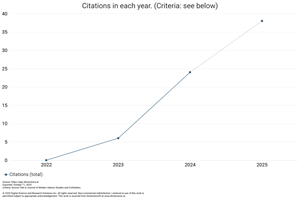Questioning about Legality of Cash Waqf within Civilization Progress
DOI:
https://doi.org/10.59653/jmisc.v1i03.1548Keywords:
cash waqf, legality of waqf, progress of civilizationAbstract
This study aims to find out how the permissibility of cash waqf in the development of civilization progress. This study uses a qualitative method with a descriptive analytical approach. The results of the study indicate that in line with the progress of human civilization, cash waqf can be carried out by considering professionalism in management.
Downloads
References
Al-Daihani, M., Dirie, K. A., Alam, M. M., & Abdullah, A. S. (2023). Business process model for “crowdfunding cash waqf model.” Journal of Islamic Accounting and Business Research. https://doi.org/10.1108/JIABR-02-2023-0046
Allah Pitchay, A., Sukmana, R., Ratnasari, R. T., & Abd Jalil, M. I. (2023). A study of cash waqf contribution between millennials of Malaysia and Indonesia. International Journal of Islamic and Middle Eastern Finance and Management, 16(4). https://doi.org/10.1108/IMEFM-01-2022-0034
Ascarya, A., & Masrifah, A. R. (2023). Strategies implementing cash waqf system for Baitul Maal wat Tamwil to improve its commercial and social activities. International Journal of Islamic and Middle Eastern Finance and Management, 16(1). https://doi.org/10.1108/IMEFM-10-2020-0504
Ascarya, A., Sukmana, R., Rahmawati, S., & Masrifah, A. R. (2023). Developing cash waqf models for Baitul Maal wat Tamwil as integrated Islamic social and commercial microfinance. Journal of Islamic Accounting and Business Research, 14(5). https://doi.org/10.1108/JIABR-09-2020-0267
Ashfahany, A. El, & Lestari, N. (2023). Optimizing Cash Waqf and Cash Waqf Linked Sukuk : The Role of Nazhir and The Strategies. IQTISHADIA, 15(2). https://doi.org/10.21043/iqtishadia.v15i2.16353
Asmara, T. T. P., & Abubakar, L. (2019). Juridical Study on the Optimization of Cash Waqf Management by Islamic Bank in Indonesia. Padjadjaran Jurnal Ilmu Hukum, 6(3). https://doi.org/10.22304/pjih.v6n3.a1
Azrai Azaimi Ambrose, A. H., & Abdullah Asuhaimi, F. (2021). Cash waqf risk management and perpetuity restriction conundrum. ISRA International Journal of Islamic Finance, 13(2). https://doi.org/10.1108/IJIF-12-2019-0187
Berakon, I., Aji, H. M., & Hafizi, M. R. (2022). Impact of digital Sharia banking systems on cash-waqf among Indonesian Muslim youth. Journal of Islamic Marketing, 13(7). https://doi.org/10.1108/JIMA-11-2020-0337
Eficandra. (2022). The Reconstruction of High-Inherited Wealth in Minangkabau through Cash Waqf Movement. Juris: Jurnal Ilmiah Syariah, 21(1). https://doi.org/10.31958/juris.v21i1.5850
Ismail Abdel Mohsin, M. (2013). Financing through cash-waqf: a revitalization to finance different needs. International Journal of Islamic and Middle Eastern Finance and Management, 6(4). https://doi.org/10.1108/IMEFM-08-2013-0094
Ismal, R. (2022). IDENTIFYING THE OPTIMAL CASH WAQF LINKED SUKUK: INDONESIAN EXPERIENCE. Hamdard Islamicus, 45(3). https://doi.org/10.57144/hi.v45i3.500
Jatmiko, W., Haidlir, B. M., Azizon, A., Laksmono, B. S., & Kasri, R. (2024). Intergenerational analysis of cash waqf behavior: lessons learned from Indonesia. Journal of Islamic Accounting and Business Research, 15(4). https://doi.org/10.1108/JIABR-03-2022-0086
Kachkar, O. A. (2017). Towards the establishment of cash waqf microfinance fund for refugees. ISRA International Journal of Islamic Finance, 9(1). https://doi.org/10.1108/ijif-07-2017-007
Kasri, R. A., & Chaerunnisa, S. R. (2022). The role of knowledge, trust, and religiosity in explaining the online cash waqf amongst Muslim millennials. Journal of Islamic Marketing, 13(6). https://doi.org/10.1108/JIMA-04-2020-0101
Kısacık, H., & Topkar, M. (2024). Waqf Culture in the Ottoman Empire and Reflections of the Activities of Cash Waqfs on Today. Information Technology in Economics and Business. https://doi.org/10.69882/adba.iteb.2024074
Nour Aldeen, K., Ratih, I. S., & Sari Pertiwi, R. (2022). Cash waqf from the millennials’ perspective: a case of Indonesia. ISRA International Journal of Islamic Finance, 14(1). https://doi.org/10.1108/IJIF-10-2020-0223
Pambudi, I. A., Hediantoro, H., Widyaningrum, D., Saputra, R. S., Sholikhah, N., Safitri, A. N., Remalia, F. Y., Mashum, C. S., Arifah, C., Purniaji, M. A., Anam, F., Tulaulia, S., Nafisa, S. Y. S., & Imtiqomah, N. (2022). Socialization of Cash Waqf Literacy as a Waqf Solution For Millennial Generation Students in Kulon Progo Regency. Journal of Islamic Economy and Community Engagement, 2(1), 71–79. https://doi.org/10.14421/jiecem.2021.2.1.1494
Rahmania, N., & Maulana, H. (2025). Strategies for Improving Cash Waqf Fundraising Through Optimization of Cash Waqf Literacy in Indonesia (pp. 523–532). https://doi.org/10.1007/978-3-031-27860-0_48
Saiti, B., Dembele, A., & Bulut, M. (2021). The global cash waqf: a tool against poverty in Muslim countries. Qualitative Research in Financial Markets, 13(3). https://doi.org/10.1108/QRFM-05-2020-0085
Downloads
Published
How to Cite
Issue
Section
License
Copyright (c) 2023 Habib Ismail

This work is licensed under a Creative Commons Attribution-ShareAlike 4.0 International License.
Authors who publish with this journal agree to the following terms:
- Authors retain copyright and grant the journal right of first publication with the work simultaneously licensed under a Creative Commons Attribution-ShareAlike that allows others to share the work with an acknowledgement of the work's authorship and initial publication in this journal.
- Authors are able to enter into separate, additional contractual arrangements for the non-exclusive distribution of the journal's published version of the work (e.g., post it to an institutional repository or publish it in a book), with an acknowledgement of its initial publication in this journal.
- Authors are permitted and encouraged to post their work online (e.g., in institutional repositories or on their website) prior to and during the submission process, as it can lead to productive exchanges, as well as earlier and greater citation of published work (See The Effect of Open Access).
























